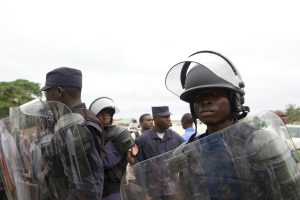Hundreds dead and missing after Nigerian town submerged by floods
3 min read
Devastating Floods in Nigerian Town of Mokwa Leave Hundreds Dead and Missing
Severe flooding has struck the Nigerian market town of Mokwa, causing widespread destruction and loss of life. At least 200 people have been confirmed dead, while another 500 remain missing as rescue operations have come to a halt. The flooding, which occurred suddenly following heavy rains early on Thursday, overwhelmed the community in just a few hours, sweeping away roads, bridges, homes, and belongings.
Mokwa, located approximately 380 kilometers west of Abuja along the banks of the River Niger, is a vital trading hub and farming region in Nigeria. The town’s economy depends heavily on agriculture and local markets, making the impact of the floods all the more devastating for residents. During Nigeria’s wet season, flooding is a common hazard, but this year’s rains have been unusually intense and prolonged, compounded by extended dry spells earlier in the season. Experts say these weather extremes have contributed to what some are calling the worst floods to hit the region in over 60 years.
Eyewitnesses describe a sudden and overwhelming surge of water that swept through the town, leaving rooftops barely visible and residents struggling to escape. Many were caught off guard by the speed and scale of the floodwaters.
Fatima Kontagora, a mother of six who lost four of her children in the disaster, shared a heartbreaking account of her ordeal: “My children and property were carried away. My own children, taken by the flood, there are four, and we’re yet to see their remains. All my property is gone, all my finances are gone; there’s nothing left for me now. Even this dress I have on was given to me by someone else. In my family alone, we lost 18 people.”
Local authorities, overwhelmed by the scale of the disaster, initially launched rescue efforts to locate survivors and provide relief to displaced families. However, the search and rescue operations have since ceased due to safety concerns and the difficulty of navigating the floodwaters and debris.
The humanitarian consequences of the flooding extend beyond immediate loss of life. Thousands of people have been displaced, with entire communities left without homes, food, or access to clean water. The destruction of infrastructure such as roads and bridges has severely hampered relief efforts and isolated affected areas.
This recent catastrophe echoes a similar flood event in September of the previous year when torrential rains and a dam collapse in Maiduguri, northeastern Nigeria, resulted in the deaths of at least 30 people and displaced millions. The Maiduguri floods further worsened the already dire humanitarian crisis in the region, which has been struggling with ongoing conflict and displacement caused by the Boko Haram insurgency.
Flooding in Nigeria is a recurring threat, often intensified by climate change, poor urban planning, deforestation, and inadequate drainage systems. Many communities near rivers like the Niger face annual floods that disrupt livelihoods and contribute to cycles of poverty and displacement.
The government and humanitarian organizations have called for increased efforts to support flood victims and implement long-term measures to reduce flood risk. These include improving early warning systems, investing in flood defenses, and addressing environmental degradation.
The toll on families like Fatima’s underscores the urgent need for comprehensive aid and recovery programs. With thousands still missing and the full extent of the damage yet to be assessed, the people of Mokwa face a long and difficult road to recovery.





